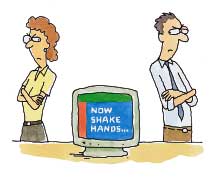Resolving Arguments by Design
By Rebecca Sloan Slotnick
Can computers mediate disagreements between humans?
Can computers mediate disagreements between humans?

DOI: 10.1511/2000.29.0
Computers are capable of all sorts of feats these days, but can they really mediate arguments between human beings? Engineers at Purdue University are in the final stages of developing a program they call FDL-CR, for Facility Design Language–Conflict Resolution, which promises to guide facility designers toward successful conflict resolution.

Tom Dunne
When the program encounters conflicting proposals—whether in plant layout design, product routing or programming of robotics equipment and visual sensors—it launches into a series of steps, modeled after conflict resolution in the social sciences and aimed at increasing understanding among designers. After an attempt at direct negotiation between conflicting parties by proposing its own version of the solution, the program recommends the introduction of additional mediators and, if all else fails, reconciliation through arbitration. Could such a program be revised to handle non-design conflicts like, say, everyday arguments or international disputes? "Perhaps," says Shimon Nof, professor of engineering and creator of the program, "but matters of social conflict are necessarily more complicated than those of facility design."—Rebecca Sloan Slotnick
Click "American Scientist" to access home page
American Scientist Comments and Discussion
To discuss our articles or comment on them, please share them and tag American Scientist on social media platforms. Here are links to our profiles on Twitter, Facebook, and LinkedIn.
If we re-share your post, we will moderate comments/discussion following our comments policy.